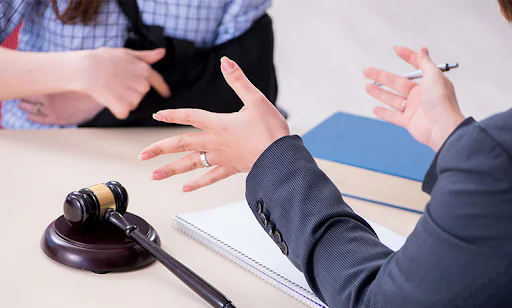So you are a savvy rider? Great! However, even the most seasoned motorcycle enthusiasts know that riding comes with its own set of ups and downs.
You want to keep in mind that while safety is a top priority, accidents can happen unexpectedly. If you are ever in a motorcycle accident, taking the right actions can help you steer clear of potential lawsuits and ensure a smoother post-accident process.
Of course, nobody wants a legal mess regardless of whether they are at fault or not. Here’s what to do after a motorcycle accident to avoid the need for motorcycle accident lawyers in Houston
1. Stay calm
Being in an accident can mess up your emotions. But you don’t want that as it can do more harm than good. When emotions run high, it’s easy to make rash decisions or say things you might regret later. As such, it’s advisable to seek guidance from experienced accident lawyers in Houston to make informed choices and protect your rights.
2. What to do after a motorcycle accident: Check for injuries
Making sure everyone’s okay after a motorcycle accident is super important. Just like any accident, the first thing is to check if you and others are hurt. If anyone is injured, first aid for motorcycle accident will come in handy.
So, take a moment to see if you’re feeling any pain, discomfort, or if it’s hard to move around. And don’t forget to also check on other folks – passengers, people walking by, and other drivers.
If anyone’s hurt, even a little, it’s really important to get them medical help as soon as possible. Taking care of any injuries quickly can make a big difference. Remember, taking care of injuries right away can prevent them from escalating and ensure everyone gets the necessary help they need.
3. Exchange information
Exchanging information is a critical step after a motorcycle accident. It helps establish a clear record of the incident and ensures that everyone involved can communicate effectively, especially when it comes to insurance claims and potential legal matters.
Here’s what you should aim to exchange with the other parties:
Names: Get the names of everyone involved, like the drivers, passengers, and anyone who saw what happened.
Contact info: Grab their phone numbers, email addresses, and whatever else you might need if things get legal.
Insurance stuff: Exchange information about insurance – the name of the company, policy number, and how to reach their insurance person.
Driver’s license: Jot down the driver’s license number and the state where they got it.
License plates: Don’t forget to write down the license plate numbers of all the vehicles involved.
Getting all this information makes sure you can talk to insurance people and others later on, which is where seeking advice from experienced accident lawyers in Houston can be beneficial.
Remember, it’s better to have too much info than not enough, so don’t be shy about asking for and giving all the important stuff.
4. Document the scene
Documenting the scene after a motorcycle accident is like creating a visual record of what happened. This step is crucial because it can provide important evidence if there are disputes or investigations later on.
When it comes to what to do after a motorcycle accident, taking photos of the accident scene, vehicle damage, road conditions, and any traffic signs or signals is unmatchable.
Documenting the scene helps preserve the details that might fade from memory over time. These images can be a valuable resource for insurance claims, legal proceedings, and even just your own peace of mind. So, channel your inner photographer and make sure you capture every relevant aspect of the accident scene.
5. Talk to witnesses
Talking to witnesses after a motorcycle accident is like adding extra pieces to the puzzle, and involving skilled accident lawyers in Houston can guide you through this process. These folks might have seen things from a different angle, and their accounts can provide valuable insights into what really happened.
6. Notify your insurance company
Notifying your insurance company after a motorcycle accident is like giving them a heads-up so they can start working their magic.
This is a smart move because it gets the wheels turning on your claim. Remember, they’re on your side, working to ensure that you get the support you need during this challenging time. You also want to keep in mind that there different types of motorcycle insurance plans to avoid unpleasant surprises.
7. What to do after a motorcycle accident: Avoid admitting fault
Even if you think you might be at fault, avoid admitting it at the scene, and consider seeking advice from experienced accident lawyers in Houston before making any statements.
Here’s the deal on how to handle this:
Stay cautious: In the heat of the moment, it’s natural to want to apologize or take the blame, even if you’re not at fault. Fight that urge and stay cautious about what you say.
Stick to facts: When talking about the accident, focus on stating the facts as you remember them. Avoid speculating or assigning blame.
Listen carefully: While listening to what others involved in the accident are saying, don’t feel pressured to admit fault if it wasn’t your responsibility.
Avoid assumptions: Even if you think you might have made a mistake, remember that accidents are complex events. Fault is not always clear-cut because there are some things you may have missed.
Consult legal advice: Most people are often you’re unsure about what to say or how to handle discussions after an accident. Whether or not you are in this category, you should not make any statements before seeking legal counsel.
Don’t sign anything: Refrain from signing any documents as they may bind you. Speak to an accident lawyer to know the way forward.
While at it, keep in mind that determining fault is a process that involves investigation, evidence, and possibly legal expertise, which is where seeking advice from skilled accident lawyers in Houston can be beneficial. And don’t let the guilt get to you because admitting fault doesn’t translate to dishonesty – rather, it’s about protecting your interests and ensuring a fair and accurate assessment of what happened.
8. Follow traffic rules
When it comes to what to do after a motorcycle accident, following traffic rules is like staying on the right path even when things go haywire. You want to stay cooperative with law enforcement and follow their instructions. Getting into further legal trouble won’t help anyone.
Even when things get crazy after an accident, sticking to traffic rules shows you care about safety and keeping things organized. It also makes things better for everyone around, including people passing by. When you follow the rules, it helps things go more smoothly after the accident. It’s like keeping a sense of responsibility and respect going, which makes everything a bit easier for everyone.
9. Consult a lawyer
You never know what to expect after a motorcycle accident. Therefore, consulting a lawyer after is like having an experienced guide to navigate tricky terrain. Here’s how to approach it:
Assess the situation: If the accident involves injuries, extensive damage, or legal complications, it might be wise to consult a lawyer.
Choose a specialist: Look for a lawyer with expertise in personal injury or motorcycle accident cases. They’ll have the knowledge to handle your situation effectively.
Get a consultation: Many lawyers offer initial consultations for free. Use this opportunity to discuss your case, ask questions, and gauge their expertise.
Understand your rights: A lawyer can help you understand your rights and legal options. They’ll guide you on how to proceed, whether it’s pursuing compensation or dealing with insurance companies.
Gather documentation: Bring any relevant documentation, such as accident reports, medical bills, and photographs, to the consultation. This helps the lawyer understand the case better.
Discuss fees: During the consultation, inquire about the lawyer’s fees and payment structure. Some work on a contingency basis, meaning they only get paid if you win the case.
Evaluate your comfort: Trust your gut feeling about the lawyer. You should feel comfortable discussing your case with them and confident in their abilities.
Ultimately, consulting accident lawyers in Houston provides you with expert advice tailored to your unique situation. They’ll help you understand the legal implications, navigate complex processes, and protect your rights. Remember, legal guidance can make a world of difference in ensuring a fair and just outcome after a motorcycle accident.
10. Keep records
Keeping records is one of the most important aspects when it comes to what to do after a motorcycle accident. You therefore want to keep a record of everything related to the accident – police reports, medical bills, communication with insurance companies, and any other relevant documents.
Having organized records can streamline the claims process, when it comes to what to do after a motorcycle accident because you’ll be able to provide evidence if legal action is necessary.
Conclusion
Confused about what to do after a motorcycle accident? Remember, the key is to keep things transparent, communicate effectively, and prioritize safety. Following these steps can help you avoid unnecessary legal headaches and keep your focus on the open road ahead.











